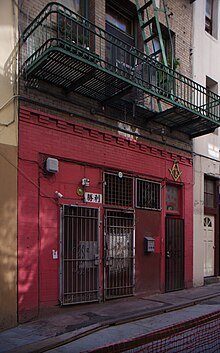Chee Kung Tong

The Chee Kung Tong (Chinese: 致公堂; Jyutping: zi3 gung1 tong4), or Gee Kung Tong, was a Chinese secret society established in 1880 and holds an active presence still. In earlier years, the society has also been recognized as the "Chinese Masons" and has been identified under various names such as Hongmen (Chinese: 洪門), Hongshuntang (Chinese: 洪順堂), and Yixingtang (Chinese: 義興堂). The fraternity founded its headquarters in San Francisco in the United States.[1]
History[edit]
The Chee Kung Tong was established as an all-male fraternity with the purpose of promoting Chinese values, customs, and the ideals of democracy, within a tight-knit network of brotherhood that has ties dating back over three hundred years prior in China. The society is considered the oldest Chinese-rooted organization established in the United States.[2]
The Chee Kung Tong are most recognized for their political support of Dr. Sun Yat-Sen, who is considered the founding father of the Republic of China. Sun Yat-Sen began a campaign to overthrow the Manchu rulers of the Qing Dynasty. In 1904, a meeting took place between The Chee Kung Tong and Sun Yat-Sen in Hawaii. The purpose of the meeting was to rally nationalist support for a future revolution that would take place in 1911.The society also assisted in Sun Yat-Sen's campaign throughout the United States.[3] The building at 36–38 Spoffard Alley in San Francisco, California had served as the temporary home for Sun Yat-sen while he lived in exile.[4]
See also[edit]
- For Public Good Party
- Chee Kung Tong Society Building in Maui; NRHP-listed
References[edit]
- ^ Ho, C., & Bronson, B. (n.d.). The chee kung tong: A Chinese secret society in Tucson, 1880–1940. JSTOR. Retrieved June 30, 2022, from https://www.jstor.org/stable/44985779
- ^ Chee Kong Tong. bostonchinesefreemasons. (n.d.). Retrieved June 30, 2022, from https://www.bostonchinesefreemasons.org/chee-kong-tong
- ^ Chinese Historical Society of New England. (n.d.). Retrieved June 30, 2022, from http://www.chsne.org/
- ^ Cerny, Susan Dinkelspiel (2007). An Architectural Guidebook to San Francisco and the Bay Area. Gibbs Smith. p. 44. ISBN 978-1-58685-432-4.
